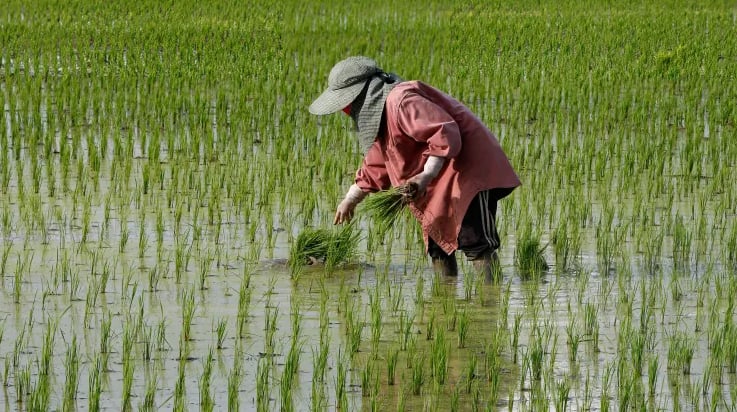November 27, 2025 | 08:47 GMT +7
November 27, 2025 | 08:47 GMT +7
Hotline: 0913.378.918
November 27, 2025 | 08:47 GMT +7
Hotline: 0913.378.918

A farmer planting rice sprouts on her rice field in Nakhon Sawan province, north of Bangkok.
Thailand is facing a spate of low rainfall. In an effort to conserve water for consumption, the Office of the National Water Resources (ONWR) has called on the country’s farmers to turn to “planting crops that use less water [which] can be harvested quickly.”
“The cumulative rainfall is about 40% less than normal, which is at high risk of water shortage,” secretary-general of the ONWR, Surasri Kidtimonton, said in a statement released by Thailand’s National Water Administration.
Kidtimonton said the country’s water management needs to “focus on water for consumption,” as well as “water for cultivation mainly for perennial crops.”
Perennial crops are crops that grow back after harvest and need not be replanted every year, unlike annual crops. Rice is categorized as an annual crop.
For every kilogram of rough rice grown, an average of 2,500 liters of water is needed. In comparison, alternative crops like millets require between 650 to 1,200 liters of water for the same amount harvested.
Just last month, India banned exports of non-basmati white rice, a move aimed at ensuring “adequate availability” in domestic markets, the government said.
India is the world’s leading rice exporter and accounts for 40% of global rice trade, and the ban is expected to affect millions.
“Global rice price will have the potential to increase further in the event that rice production in Thailand decreases significantly year on year,” Rabobank’s senior analyst Oscar Tjakra told CNBC.
However, it still remains to be seen whether Thai farmers will follow the directive, said Tjakra.
“Thai farmers might still choose to plant rice on the back of the current high global rice export prices environment,” he said.
Rice prices are already hovering at decade highs, in part due to tighter supplies when the staple became an attractive alternative as prices of other major grains surged following Russia’s invasion of Ukraine in February 2022.
“Thailand often pushes for water conservation, but it has little effect on the use of water as the water rights system has yet to be developed,” said Jeremy Zwinger, CEO of The Rice Trader told CNBC in an e-mail.
(CNBC)

(VAN) A new study reveals how the simultaneous effects of ocean acidification, salinity and loss of oxygen are making the world more fragile.

(VAN) Hopes are growing that the creation of the first 3D turkey gut model could be a turning point in the battle against the virulent blackhead disease.

(VAN) Tyson, America’s biggest meat supplier, plans to shutter one of its largest beef processing plants as the industry continues to struggle with low cattle supplies and political pressure from Washington.

(VAN) New FAO study shows how digital solutions are empowering farmers and fishers to prevent losses and build resilient agrifood systems.

(VAN) Brazil's COP30 presidency pushed through a compromise climate deal on Saturday that would boost finance for poor nations coping with global warming but that omitted any mention of the fossil fuels driving it.

(VAN) Poultry farmers in the UK have been warned that they could face one of the worst winters yet for bird flu.

(VAN) Prices of main-crop paddy have risen sharply, with jasmine rice hitting 16,100 baht per tonne — the highest level in years.